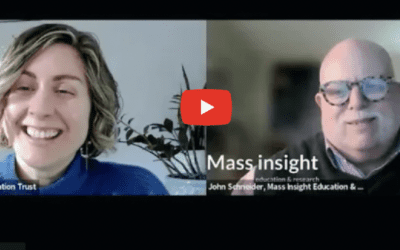The Boulder Fund grant will allow Mass Insight to pilot a new program targeting middle school readiness. May. 22, 2025 –Boston– Mass Insight Education & Research’s President and CEO, Andrea Wolfe, has been selected in the 2025 cohort of Education Leaders of...
Does school climate really matter? We think so. — Lesson Three From Revisiting the Turnaround Challenge
This is the third of seven blog posts that will highlight the key points in Mi’s recent report, Revisiting the Turnaround Challenge. The report examined the outcomes of three “turnaround zones” implemented by urban public school districts in partnership with Mi between 2012-2019. Our goal was to learn from our past work to help school and district leaders and State Education Agency staff accelerate pandemic recovery in low-performing schools and begin the difficult task of reinventing public education to better serve systemically marginalized students.
The Turnaround Challenge identifies four critical resources, or conditions, that school and district leaders must leverage effectively to turn around low-performing schools: time, people, money, and program. Our study revealed that district and zone climate — the quality and character of a district or zone life as emerged through interpersonal interactions—can also impact zone implementation and outcomes. Two key findings emerged about climate:
- The zone with the most trusting relationships and collaborative interpersonal interactions was the only zone to improve test scores during every year of the intervention, with improvement becoming statistically significant during years two and three.
- The zones with more compliance-oriented or conflictual climates either did not experience any statistically significant improvement in student outcomes or experienced statistically significant improvement for only one year.
These findings suggest that climate is a critical resource to be leveraged to transform schools. Since the release of The Turnaround Challenge, Mi has worked with many partners on climate-related initiatives to increase access, belonging, and equitable practices for all.
For example, in 2021, Mi partnered with Aldine Independent School District in North Houston, Texas to conduct a district-wide equity audit. The equity audit was part of a greater district commitment spearheaded by Superintendent Goffney to provide “a rigorous and enriching educational experience that prepares every student for success in college, career, and life.” Aldine ISD saw the equity audit as an opportunity to engage students and the community to understand how district policies and practices impact campus climate and student outcomes, specifically for Black students. Mi’s equity audit helped Aldine ISD gather data and perspectives to improve the quality and character of interactions among district stakeholders for a more equitable experience. Equity audits illuminate the correlations between climate and multiple aspects of students’ experiences and outcomes, including attendance, graduation rate, student and staff engagement, staff diversity, and collective responsibility for students’ success.
In 2023, Aldine ISD and Mi brought community stakeholders together to understand the root causes of equity issues impacting campus and district climate and develop shared definitions for diversity, equity, and inclusion in Aldine. The district believed this level of community dialogue was a foundational step towards ensuring all students in Aldine experience high levels of trust and positive interpersonal interactions.
Aldine ISD has continued to take steps to improve systems and structures that prioritize a climate in which students thrive, including launching a new staff recruitment and hiring strategy to attract, hire, cultivate, and retain a diverse and qualified workforce who represent the students they serve and who can build strong relationships to support students.
Click here to read the next blog post in this series.

Recent Posts
Cybersecurity Event Introduces Students to Cyber Careers
For the 5th year in a row, Mass Insight Education & Research is hosting the Cybersecurity and You Workshop to introduce Advanced Placement® (AP) STEM high school students to cybersecurity scenarios and concepts as well as postsecondary education and career paths....
Adolescent Literacy Crisis: IES Guide In Action – Webinar
What does the evidence say about how schools can improve the adolescent literacy crisis happening in our country? In this webinar, we explore the Institute of Education Sciences Reading Intervention Guide for Grades 4 through 9, found here, and diving into two of the...
You may also like
An Interview with Mass Insight AP Students and their Teacher
https://youtu.be/mQTeW8-sX40 We sat down with two Mass Insight AP STEM & English Program students, Ben and Chris-Ander, and their teacher, William Pellegrino, to hear about their educational journeys, their experiences in AP classes and as vocational students, and...
An Interview with Kristen Hengtgen of The Education Trust
https://youtu.be/1ZfxNShHJOU?si=d1a1GoVrgrDWT5Cu Kristen Hengtgen, Ph.D. is a senior analyst on The Education Trust's P-12 policy team and co-author of their new report, Increasing Access to Advanced Coursework in Massachusetts. In this interview, she joins Mass...
Creating the conditions for greater success of systemically disadvantaged students in AP: Next steps for the Massachusetts AP STEM & English program
Recently the New York Times published an article entitled, Why is the College Board Pushing to Expand Advanced Placement? The article focuses on an important issue: there’s been greater growth in AP participation for Black and Latino students and students living in...



